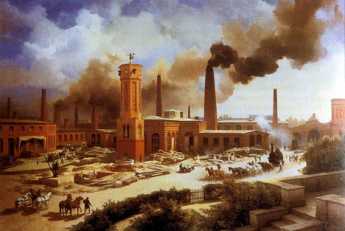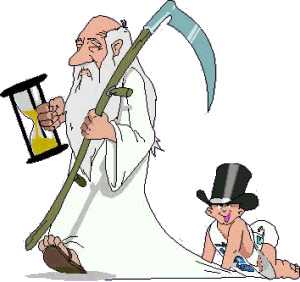Related Topics
Dislocations: Financial and Fundamental
The crash of 2007 was more than a bank panic. Thirty years of excessive borrowing had reached a point where something was certain to topple it. Alan Greenspan deplored "irrational exuberance" in 1996, but only in 2007 did everybody try to get out the door at the same time. The crash announced the switch to deleveraging, it did not cause it.
Who Killed Philadelphia Industry?

|
| The Industrial Revolution |
The term "Rust Belt" makes clear that Philadelphia is only one city in a whole region which lost its industrial core. The Industrial Revolution surely isn't over, it has moved. When we had too much of it, we deplored the smoke and fog of industry, its acid rain, its grimy desolation. But now that industry has obliged us by departing, we miss it, if for no better reason than it imposed structure on the city. It was the organizing principle, which we now need to replace with something more than the dreams and sketches of architects and planners. Figure out what we want the city to be, or at least try to figure out where it is going. And then, the city will shape itself. Philadelphia is far from the worst afflicted city in the region; compared with Detroit, it was hardly affected. What determines relative success within regional decline is whether a city has other assets, sufficient to create substitute routes to success. In Philadelphia's case, non-profit activity provided survival, but the avoidance of profits soon became altogether too praiseworthy.
My friend the railroad lawyer gives an unexpected answer to the question why we no longer have much industry in Philadelphia. The cause, in his wry phrase, is air conditioning. Not even Congressional logrolling would have been able to push industry into Huntsville, Alabama or even Atlanta, without air conditioning to make those places inhabitable. He jests. The South has developed the infrastructure to take its place in the industrial world and has a lower wage scale at all levels of society. The Second World War stirred them out of their provincialism, the GI Bill educated them. And let's face it, the migration of their black people from the rural south to the urban north reduced the strain on southern education and welfare, at the same time it imposed much of that burden on the haughty Civil War victors. There had been a massive migration westward of the white South, fleeing the devastation of the Civil War; but the blacks didn't much participate in that. Their migration from the former slave states came by the busload after the end of World War II.
We focus on the newly industrialized South as a competitor because it is more personal; we know the cities of the South and Southwest are growing rapidly, and we have a fair idea of who is moving there. Meanwhile, the rest of the underdeveloped world is flowering, economically developing, at a far faster rate. Over a billion Chinese and Indians have been lifted out of unspeakable poverty and transformed into serious economic competitors. Air conditioning sort of gets the idea across. But the word we are searching for is -- globalization. Philadelphia is a perfectly wonderful place to live, particularly if you are able to retire here. What we lack is a sustainable way to earn a living.
It took the destruction of eight railroads to break the back of the industrial unions. The union movement has shifted to the public sector by exploiting a highly dubious partnership with urban political machines. This sort of thing must not be permitted to continue unresisted, if only to avoid the example of New Jersey with the apparent invasion of politics by the Mafia entering by way of union politics, maybe by way of the legalized gambling industry. It requires no advanced degree in economics to see that aggregation of non-productive sectors into a political force is incompatible with success in a globalized world. Foreign competitors will destroy businesses which yield, and the bond market will teach the public sector a bitter lesson.
Globalization did not destroy the Rust Belt, it simply gave a shove to a tottering structure. By the 1920s, our industries had enjoyed their expected seventy-five-year life span; the 1929 crash was a belated recognition of the facts. The ensuing Depression and World War II protected our obsolete industrial plant from foreign competition, but by 1960 our monopoly was under attack by modern new factories abroad, enjoying cheap labor, copying our methods. In what has proved to be the most astute investment judgment of a century, the DuPont family perceived the facts and sold General Motors, just as they had earlier given up the gunpowder business to make nylon stockings. It would be exaggerated to say that political subsidies kept the auto business alive for another forty years after the duPonts got rid of it, but that would appear to be approximately true. The seller of any business is in position to foretell its future better than most buyers and is looking for top dollar to dress it up and cash out.
We thus arrive at the conclusion that no one in particular killed Philadelphia industry, at least to the extent it is unproductive to search for villains. My friend the lawyer feels maritime unions were more guilty than other unions, and he has no reason to love railroad unions. But if it can be accepted that Philadelphia's main problem was to fail to replace aging industries with new ones, the more productive search lies among correctible obstacles for new businesses. Since globalization has apparently resulted in Philadelphia's impaired competitiveness for untrained and uneducated workers, it would seem most productive to educate more of them up and out of that class. Our clearly dysfunctional public school system must either be improved or radically revised; the teachers' unions seem to be a serious problem to address. For some reason, the most serious problems appear in the fourth grade.

|
| Father Time Baby New year |
Our criminal justice system seems to be in a circular pattern which must be broken. We spend too much on police, prisons, and courts, to the point where convicted criminals exceed the prison capacity, and courtroom procedures seem designed to avoid convictions. Our local judges are a national joke, with an excessive tendency to settle cases out of an inexperienced judge's fear of his own inability to conduct a trial. In fact, the chief justice of our state supreme court is presently accused of corruption in the location of the family courts. Apparently much could be accomplished simply; the number of liability filings is down over 50% in a few years, simply by a few changes in civil procedures. Increasingly, lawyers are turning to alternative dispute resolution under private auspices. Apparently, litigants on both sides find it preferable to pay for private judging than to utilize the free judging provided by the Commonwealth. Surely, both the law schools and the bar associations are derelict in their implicit duty to guide the public through this arcane labyrinth. Perhaps the solution, and maybe the source of the problem, is to be found in the State Legislature.
The Legislature, now there's a piece of work. Between the gerrymandering they create and the single party urban machines which command their nominating primaries, it is hard to believe a reform movement can have more than transient effect, or that a tea party could unite around an effective solution. Proposition Fourteen in California (open, non-party primaries) is a promising idea, but probably it will not be possible to amend the state legislative process with a single stroke, and then everybody could go home. This project seems more likely to require large private contributions to multiple in-depth studies of the history and intricacies of the local governance problem, together with a series of tentative steps and revisions over at least a decade. Perhaps a portion of the money now being spent purchasing and trading professional sports teams could be diverted to generating the ideas and research, maybe the publicity, required to accomplish such an ambitious project. But for a beginning, Proposition Fourteen has the right idea; politics keeps its stranglehold on reform through iron control of the nominating process.
In addition to cleaning up the governance mess, we need to look at the industries we have driven away, to see how to mend our ways.
Originally published: Friday, June 18, 2010; most-recently modified: Wednesday, June 05, 2019